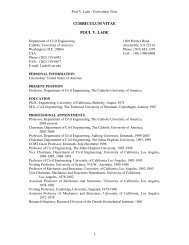Nota Bene-- C:\ARTICLES\TERMIN~1.NB Job 1 - the Catholic ...
Nota Bene-- C:\ARTICLES\TERMIN~1.NB Job 1 - the Catholic ...
Nota Bene-- C:\ARTICLES\TERMIN~1.NB Job 1 - the Catholic ...
You also want an ePaper? Increase the reach of your titles
YUMPU automatically turns print PDFs into web optimized ePapers that Google loves.
enslaved to God, you have <strong>the</strong> fruit which leads to your sanctification, whose final result (τε'λος)<br />
is eternal life.” And in 13:7 it has <strong>the</strong> technical sense of “toll”: “Pay to all <strong>the</strong>ir dues...<strong>the</strong> toll<br />
(τε'λος) to whom <strong>the</strong> toll (τε'λος) is due.” See J. P. Heil, Paul’s Letter to <strong>the</strong> Romans: A Reader-<br />
Response Commentary (New York: Paulist, 1987) 72, 143.<br />
4 For <strong>the</strong>se last three suggestions, see D. J. Moo, The Epistle to <strong>the</strong> Romans (NICNT;<br />
Grand Rapids: Eerdmans, 1996) 641-42.<br />
5 Romans 10:4 is a limited statement in a different sense according to T. R. Schreiner,<br />
Romans (BECNT 6; Grand Rapids: Baker, 1998) 547-48. He understands ει�ς in 10:4 not as a<br />
preposition of result or purpose, as we and o<strong>the</strong>rs understand it, but “as an adverbial preposition<br />
of general reference” in which ει�ς δικαιοσυ' νην means “with reference to righteousness” for those<br />
who believe (p. 547). Consequently, he states that “Christ is not <strong>the</strong> end of using <strong>the</strong> law for<br />
righteousness for all people” (p. 548), but only for those who believe. For Schreiner <strong>the</strong><br />
statement is limited in <strong>the</strong> sense that it applies only to those who believe. For us <strong>the</strong> statement is<br />
limited in <strong>the</strong> sense that it applies to <strong>the</strong> Law only as a means of attaining righteousness by doing<br />
its works. Hence, in contrast to Schreiner we maintain that according to Paul Christ is <strong>the</strong> end of<br />
using <strong>the</strong> Law for righteousness for all people, because righteousness is now available not to<br />
those who futilely try to do <strong>the</strong> works of <strong>the</strong> Law but to anyone who believes in what God has<br />
done in <strong>the</strong> Christ event.<br />
6 The Psalms were considered to be authored by David and to belong to that part of<br />
scripture known as “<strong>the</strong> Prophets;” cf. Matt 13:35.<br />
7 Heil, Paul’s Letter to <strong>the</strong> Romans, 99-135; idem, Romans--Paul’s Letter of Hope (AnBib<br />
112; Rome: Biblical Institute, 1987) 63-82.<br />
8 After discussing but dismissing all <strong>the</strong> o<strong>the</strong>r possibilities for <strong>the</strong> genitive construction,<br />
“Law of righteousness” (νο' µον δικαιοσυ' νης) in 9:31, Moo (Romans, 622-25) convincingly<br />
argues for <strong>the</strong> meaning of “Law whose object is righteousness.” See also Schreiner, Romans,<br />
537; Martin, Christ and <strong>the</strong> Law, 135-38.<br />
9 That righteousness ra<strong>the</strong>r than <strong>the</strong> Law is <strong>the</strong> ultimate object of Israel’s pursuit in 9:31 is<br />
16
















